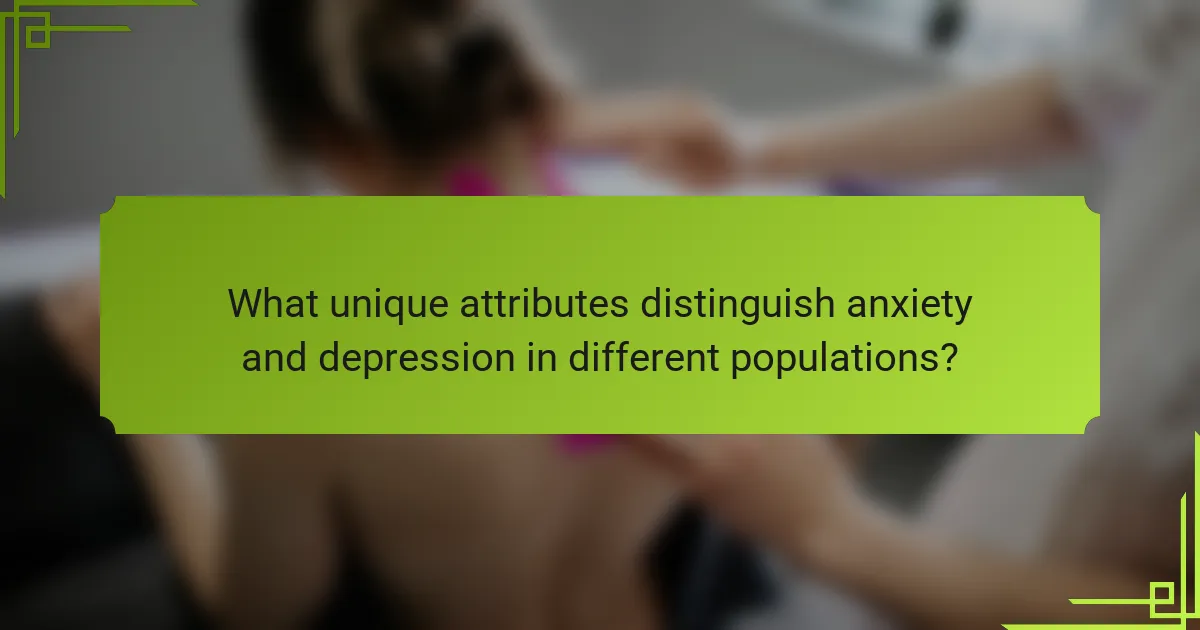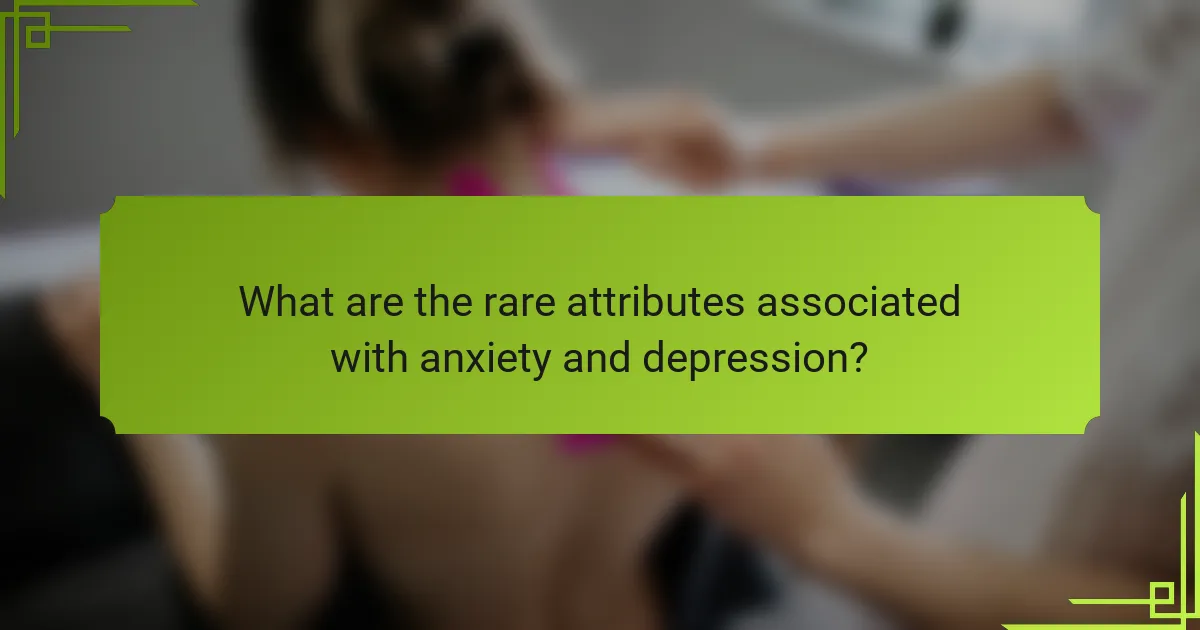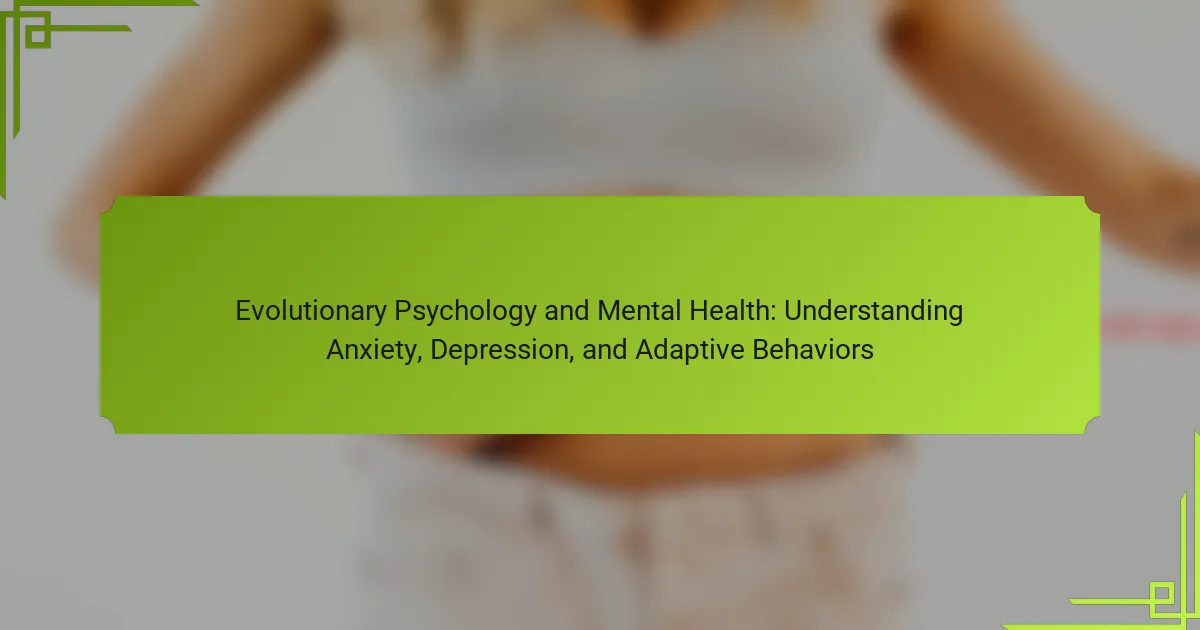Understanding the adaptive nature of anxiety and depression can enhance mental health treatment. Evolutionary psychology explains these emotions as responses to environmental threats. It highlights the importance of adaptability, social connection, and emotional regulation. The article explores how cultural context and genetic factors influence mental health, along with practical strategies rooted in evolutionary principles to improve well-being.

How does Evolutionary Psychology explain Anxiety and Depression?
Evolutionary psychology suggests that anxiety and depression are adaptive responses to environmental threats. These emotions historically helped our ancestors survive by promoting caution and social bonding. Anxiety triggers vigilance, while depression can signal the need for social support. Understanding these mechanisms can inform modern mental health treatments.
What are the evolutionary roots of anxiety?
Anxiety has evolutionary roots as an adaptive response to threats. It enhances survival by promoting vigilance and quick reactions in dangerous situations. This response is linked to the fight-or-flight mechanism, which prepares individuals to face or escape threats. Over time, these adaptive behaviors have been ingrained in human psychology, leading to anxiety’s prevalence in modern life. Research indicates that anxiety can stem from genetic predispositions and environmental factors, further illustrating its complex evolutionary background. Understanding these roots can inform approaches to mental health treatment and management strategies.
How has depression been viewed through an evolutionary lens?
Depression has been viewed as an adaptive response to environmental challenges. Evolutionary psychology suggests that depressive symptoms may have conferred survival advantages by promoting social withdrawal and reflection. This behavior could help individuals reassess their circumstances and develop coping strategies. Research indicates that depressive episodes may facilitate problem-solving and enhance social bonds in supportive environments. Understanding these perspectives can reshape approaches to mental health treatment, focusing on adaptive behaviors rather than solely on symptoms.
What are the adaptive functions of anxiety?
Anxiety serves adaptive functions by enhancing survival through increased vigilance and preparedness. It prompts individuals to recognize threats, facilitating quick responses to danger. This heightened awareness can lead to better decision-making in stressful situations. Additionally, anxiety can strengthen social bonds, as it often motivates individuals to seek support from others, fostering group cohesion.
What role does depression play in social dynamics?
Depression significantly influences social dynamics by affecting interpersonal relationships and group behaviors. It can lead to withdrawal from social interactions, altering group cohesion and communication patterns. Individuals with depression may struggle to engage, impacting their social networks and support systems. This withdrawal can create a feedback loop, exacerbating feelings of isolation and reinforcing depressive symptoms. Moreover, the presence of depression in social settings can alter group dynamics, as peers may feel uncertain on how to respond, leading to stigma and misunderstanding. Understanding these effects is crucial for fostering supportive environments that address mental health needs.

What are the universal attributes of mental health in Evolutionary Psychology?
The universal attributes of mental health in Evolutionary Psychology include adaptability, social connection, and emotional regulation. These attributes reflect how mental health evolved to enhance survival and reproduction. Adaptability allows individuals to respond effectively to changing environments. Social connection fosters support networks, crucial for coping with stress. Emotional regulation helps manage responses to threats, promoting resilience.
How do evolutionary pressures shape mental health outcomes?
Evolutionary pressures significantly influence mental health outcomes by shaping adaptive behaviors related to anxiety and depression. These conditions may have evolved as survival mechanisms, promoting vigilance and caution in potentially dangerous environments. Anxiety, for example, can enhance awareness of threats, while depressive symptoms may encourage withdrawal and conserve energy during adverse situations. Research indicates that these evolutionary traits, while beneficial in ancestral contexts, can manifest as maladaptive in modern settings, leading to increased mental health issues. Understanding this evolutionary framework helps in developing targeted interventions for anxiety and depression.
What common adaptive behaviors are linked to mental health?
Common adaptive behaviors linked to mental health include social withdrawal, heightened vigilance, and emotional regulation. These behaviors are evolutionary responses to stressors, aiding survival. For instance, social withdrawal can prevent exposure to threats, while vigilance enhances awareness of danger. Emotional regulation helps manage anxiety and depression, promoting resilience. Understanding these behaviors provides insights into mental health challenges and informs therapeutic approaches.
How does social bonding influence mental health?
Social bonding significantly enhances mental health by fostering emotional support and reducing feelings of isolation. Strong social connections can mitigate anxiety and depression, promoting resilience and adaptive behaviors. Research indicates that individuals with robust social networks experience lower stress levels and improved emotional well-being. The evolutionary perspective suggests that social bonding has adaptive value, enhancing survival through cooperative behaviors and shared resources.
What is the significance of stress responses?
Stress responses are significant as they are evolutionary adaptations that enhance survival. These responses activate the body’s fight-or-flight mechanism, preparing individuals to face threats or escape danger. This biological reaction influences mental health, as chronic stress can lead to anxiety and depression. Understanding these responses helps in developing adaptive behaviors that promote resilience and emotional well-being. Stress responses also highlight the interplay between physiological reactions and psychological states, emphasizing the importance of addressing mental health in the context of evolutionary psychology.

What unique attributes distinguish anxiety and depression in different populations?
Anxiety and depression manifest differently across populations due to unique attributes such as cultural context, genetic predisposition, and environmental factors. For instance, cultural stigma can amplify symptoms in certain groups, while genetic factors may predispose others to higher anxiety levels. Additionally, environmental stressors, like socioeconomic status, can lead to varying prevalence rates. Understanding these distinctions is crucial for tailored interventions in mental health.
How do cultural factors influence the expression of anxiety?
Cultural factors significantly shape how individuals express anxiety. These influences include societal norms, values, and expectations surrounding emotional expression. For instance, collectivist cultures may encourage restraint, leading to less overt displays of anxiety, while individualistic cultures might promote open expression. Additionally, cultural stigma around mental health can affect whether individuals seek help or discuss their feelings. Understanding these dynamics is crucial for mental health professionals in providing culturally sensitive care.
What unique coping mechanisms are observed in various demographics?
Unique coping mechanisms vary significantly across demographics, influenced by cultural, social, and psychological factors. For instance, collectivist cultures often emphasize community support, fostering resilience through social networks. In contrast, individualistic societies may promote personal coping strategies, such as self-reflection or therapy. Age also plays a role; younger individuals might utilize technology-based solutions, while older adults may prefer traditional methods like mindfulness or physical activity. Additionally, socioeconomic status impacts access to resources, shaping coping styles. Understanding these unique mechanisms can enhance mental health interventions tailored to specific groups.
How does gender impact anxiety and depression responses?
Gender significantly influences anxiety and depression responses due to biological, social, and psychological factors. Research indicates that women are more likely to experience anxiety and depression, often linked to hormonal fluctuations and social expectations. Men, conversely, may exhibit higher rates of externalizing behaviors like substance abuse when faced with similar emotional challenges.
The impact of gender on mental health can also be seen in coping strategies. Women tend to seek social support, while men often resort to avoidance. This difference in coping mechanisms can affect treatment outcomes, as women may respond better to therapeutic interventions.
Additionally, societal norms regarding masculinity and femininity can shape how individuals express their mental health struggles. Men may feel pressured to suppress emotions, leading to underreporting of anxiety and depression symptoms. Understanding these gender dynamics is crucial for tailoring effective mental health interventions.
Overall, recognizing the unique attributes of gender-related responses to anxiety and depression can enhance mental health strategies and promote better outcomes for all individuals.
What role does socioeconomic status play in mental health?
Socioeconomic status significantly influences mental health by affecting access to resources, stress levels, and social support. Individuals with lower socioeconomic status often experience higher rates of anxiety and depression due to financial instability and limited access to healthcare. Studies show that 20% of those in lower socioeconomic groups report mental health issues compared to 10% in higher groups. Additionally, chronic stress from financial insecurity can exacerbate existing mental health conditions, creating a cycle of disadvantage. Addressing these disparities is crucial for improving overall mental health outcomes.

What are the rare attributes associated with anxiety and depression?
Anxiety and depression exhibit rare attributes that highlight their complex interplay within evolutionary psychology. These attributes include atypical emotional responses, unique neurobiological patterns, and distinct behavioral adaptations. For instance, individuals may experience heightened sensitivity to environmental stressors, which can serve as an adaptive mechanism for survival. Additionally, genetic predispositions can influence the manifestation of these conditions, revealing a rare link between evolutionary traits and mental health outcomes. Understanding these attributes enhances our comprehension of anxiety and depression as adaptive behaviors shaped by evolutionary pressures.
What uncommon evolutionary adaptations have been observed?
Uncommon evolutionary adaptations include traits that enhance survival and reproductive success in unique environments. For instance, certain human populations have developed lactose tolerance, allowing them to digest dairy in adulthood. Another example is the ability to perceive a wider range of colors in some primate species, improving foraging efficiency. These adaptations reflect the interplay between environmental pressures and psychological responses, influencing behaviors related to anxiety and depression. Understanding these adaptations can provide insights into human mental health and adaptive behaviors.
How do rare psychological disorders relate to evolutionary theory?
Rare psychological disorders can illustrate aspects of evolutionary theory by showcasing how certain traits may have conferred survival advantages. For instance, heightened anxiety can enhance vigilance against threats, while depressive symptoms might foster social bonding and problem-solving in communal contexts. These behaviors, though maladaptive in some scenarios, may reflect adaptive responses to ancestral environments. Understanding these connections helps clarify the complex interplay between mental health and evolutionary pressures.

What practical strategies can improve mental health from an evolutionary perspective?
Engaging in practical strategies rooted in evolutionary psychology can significantly enhance mental health. These strategies include fostering social connections, practicing mindfulness, and engaging in physical activity.
Social connections are vital for emotional well-being. Humans evolved as social beings, and strong relationships can buffer against anxiety and depression. Mindfulness practices, such as meditation, help individuals become aware of their thoughts and feelings, promoting emotional regulation. Regular physical activity is another adaptive behavior that releases endorphins, improving mood and reducing stress.
Implementing these strategies can create a holistic approach to mental health, aligning with our evolutionary heritage.
How can understanding evolutionary psychology enhance therapeutic approaches?
Understanding evolutionary psychology enhances therapeutic approaches by providing insights into the origins of anxiety and depression. This perspective allows therapists to identify adaptive behaviors that may contribute to mental health issues. For instance, recognizing the evolutionary roots of fear can help in developing targeted interventions. Additionally, evolutionary psychology emphasizes the importance of social connections, which can inform therapeutic strategies that foster supportive relationships. Overall, integrating these insights can lead to more effective and personalized treatment plans for clients.
What are the best practices for addressing anxiety and depression?
To effectively address anxiety and depression, individuals should adopt evidence-based practices that promote mental well-being. Cognitive-behavioral therapy (CBT) is a proven approach that helps modify negative thought patterns. Regular physical activity can also alleviate symptoms by releasing endorphins, which improve mood. Mindfulness and meditation practices foster self-awareness and reduce stress. Establishing a strong support network enhances resilience and provides emotional comfort. Lastly, maintaining a balanced diet contributes to overall mental health by stabilizing mood and energy levels.
What lifestyle changes can support mental health?
Lifestyle changes that support mental health include regular exercise, balanced nutrition, adequate sleep, and mindfulness practices. These changes can reduce anxiety and depression by promoting adaptive behaviors. For example, aerobic exercise releases endorphins, enhancing mood. A diet rich in omega-3 fatty acids supports brain function. Quality sleep improves emotional regulation. Mindfulness practices, such as meditation, foster resilience. Implementing these changes can lead to significant mental health improvements.
How can community support systems be optimized?
Community support systems can be optimized by enhancing accessibility, fostering inclusivity, and leveraging technology. Accessibility ensures that resources are available to all individuals, particularly those in marginalized groups. Inclusivity promotes participation from diverse demographics, which enriches the support network. Leveraging technology, such as online platforms and mobile applications, facilitates communication and resource sharing. These strategies can significantly improve mental health outcomes by creating adaptive behaviors that address anxiety and depression effectively.
What common mistakes should be avoided in mental health management?
To effectively manage mental health, avoid common mistakes such as neglecting self-care, misinterpreting symptoms, and relying solely on medication. Prioritize holistic approaches that include therapy and lifestyle changes. Acknowledge the role of evolutionary psychology in understanding anxiety and depression, as adaptive behaviors may influence mental health outcomes. Recognizing and addressing these mistakes can lead to improved mental well-being.
How can insights from evolutionary psychology lead to better mental health interventions?
Insights from evolutionary psychology can enhance mental health interventions by identifying adaptive behaviors that mitigate anxiety and depression. Understanding these behaviors allows for tailored strategies that align with human evolutionary traits. For example, recognizing the role of social connections in emotional resilience can inform therapeutic practices. Research indicates that interventions incorporating evolutionary insights lead to improved outcomes, as they address root causes of mental health issues rather than just symptoms. This approach fosters a deeper understanding of the human experience, enhancing the effectiveness of mental health support.
